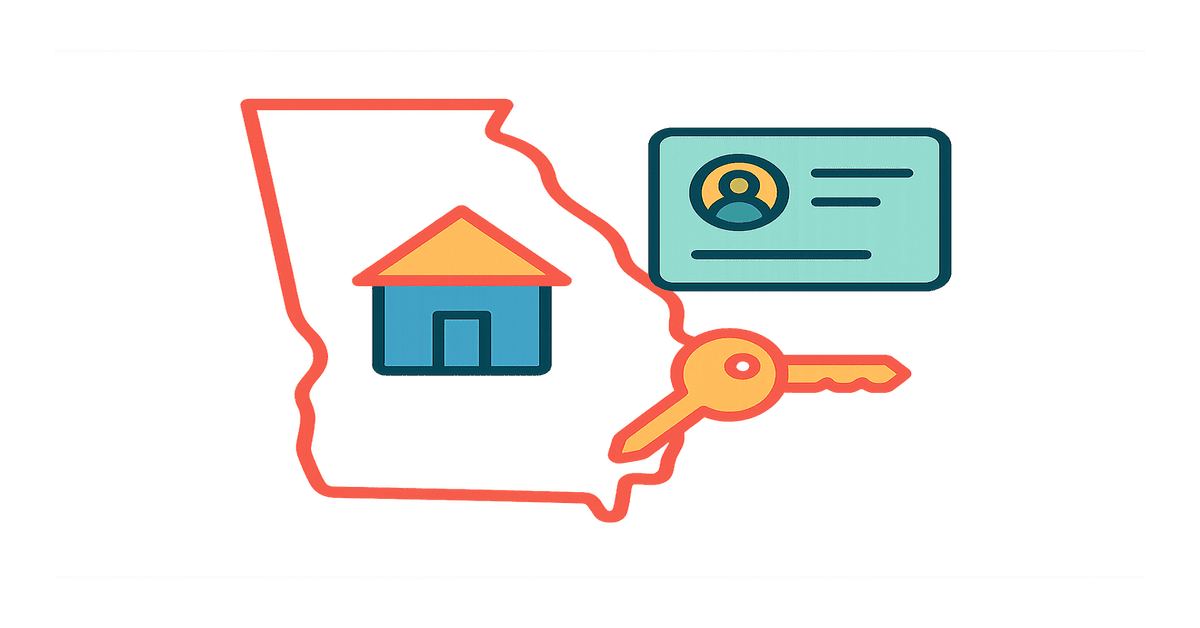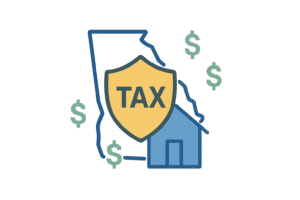How to Get Certified as a Property Manager in Georgia
Property manager requirements in Georgia can feel overwhelming, especially when you’re trying to navigate Georgia’s specific requirements. With over 20 years of experience as a…

Property manager requirements in Georgia can feel overwhelming, especially when you’re trying to navigate Georgia’s specific requirements. With over 20 years of experience as a Georgia real estate closing attorney, I’ve witnessed countless aspiring property managers stumble through the certification process, often making costly, avoidable mistakes.
The good news is that getting certified as a property manager in Georgia follows a clear, step-by-step process. While it requires dedication and meeting specific legal requirements, the path is straightforward once you understand what’s expected. This comprehensive guide will walk you through every requirement, from earning your initial real estate license to potentially starting your own property management company.
The First Step: Understanding the Property Manager’s Role in Georgia
Property Manager Requirements in Georgia: Legal Overview
In Georgia, it may surprise many people to learn that you cannot legally manage rental properties for others without a real estate license. This is not just a suggestion; it is state law. I have seen well-meaning individuals attempt to start property management services without proper licensing, only to face legal consequences when the Georgia Real Estate Commission caught up with them. One case involved someone managing over 50 rental properties without a license, resulting in hefty fines and a cease-and-desist order that immediately shut down their operation.
The Georgia Real Estate Commission considers property management a form of real estate activity. When you collect rent, handle lease agreements, or manage rental properties on behalf of property owners, you’re engaging in activities that require state oversight and licensing.
The difference between a “certified” designation and a state-mandated license trips up many newcomers to the real estate industry. A license is legally required. You cannot practice property management without it. Professional certifications, like the Certified Property Manager designation from the Institute of Real Estate Management, are voluntary credentials that enhance your expertise and marketability but do not replace the legal requirement for licensing.
What a Georgia Property Manager Does

Property management involves far more than collecting rent checks. A licensed property manager handles the complete spectrum of rental property operations. A breakdown of day-to-day operations and administrative tasks: Daily operations include screening prospective tenants, conducting property inspections, coordinating routine maintenance, processing security deposits, and managing lease renewals. Administrative tasks encompass maintaining detailed records, handling month-to-month lease termination notices, managing resident communications, and ensuring compliance with Georgia landlord-tenant laws. Core responsibilities, from attracting prospective tenants to handling routine maintenance and maintenance requests:
| Responsibility | Description |
|---|---|
| Tenant Acquisition | Marketing vacant units, screening applications, conducting background checks, and executing lease agreements |
| Financial Management | Collecting rent, managing security deposits, handling late fees, and maintaining accurate financial records |
| Property Maintenance | Coordinating repairs, managing maintenance requests, conducting regular inspections, and ensuring properties remain in good condition |
| Legal Compliance | Following fair housing laws, adhering to state regulations, and managing legal issues when they arise |
| Communication | Serving as the primary contact between property owners and tenants |
Step 1: Earning Your Georgia Real Estate Salesperson License
Meeting the Educational Requirements

Georgia maintains specific educational standards for anyone entering the real estate industry, including aspiring property managers. Specific requirements for a high school diploma or equivalent: The state requires all applicants to have completed high school or earned an equivalent credential, such as a GED. This foundational education requirement ensures candidates possess basic literacy and mathematical skills essential for handling complex transactions and legal documents. The mandatory 75-hour pre-licensing course and how it prepares aspiring property managers: Georgia mandates 75 hours of pre-licensing education covering real estate law, property management laws, contracts, finance, and ethics. This coursework directly applies to property management, teaching essential concepts like landlord-tenant relationships, fair housing requirements, and legal obligations. The curriculum includes:
| Topic | Description |
|---|---|
| Real Estate Law Fundamentals | Understanding Georgia law as it applies to property transactions |
| Contract Law | Essential for drafting and managing lease agreements |
| Property Management Principles | Core concepts for managing rental properties |
| Fair Housing Requirements | Critical for avoiding discrimination claims |
| Ethics and Professional Standards | Guidelines for maintaining ethical standards in all transactions |
The Exam and Application Process
How to register for and pass the Georgia real estate exam: After completing your pre-licensing education, you’ll schedule your exam through PSI, the testing company contracted by the Georgia Real Estate Commission. The exam consists of two portions: a national section covering general real estate principles and a Georgia-specific section focusing on state laws and regulations. I always advise test-takers to focus heavily on Georgia-specific property management laws during their preparation. The state section includes questions about security deposit handling, eviction procedures, and other property management essentials that directly impact your future work. Submitting your application to the Georgia Real Estate Commission and the legal requirements to get licensed: Once you pass the exam, you must submit your license application within one year. The application requires:
- Proof of completed pre-licensing education
- Exam passing scores
- Background check and fingerprinting
- Application fee
- Sponsorship by a licensed real estate broker
The Post-Licensing Requirement
Completing the mandatory 25-hour post-license course: Georgia requires new licensees to complete 25 hours of post-licensing education within their first year. This course builds on your pre-licensing knowledge, diving deeper into practical applications and real-world scenarios you’ll encounter in property management. The post-licensing course covers advanced topics like risk management, detailed property management procedures, and complex legal issues that commonly arise in residential property management.
Step 2: Gaining Practical Experience and Finding a Broker
Why You Need a Sponsoring Broker
The legal requirement to work under a licensed real estate broker or real estate management firm: Georgia law prohibits independent property management practice for new licensees. You must work under the supervision of a licensed real estate broker or join an established real estate management firm. This is not bureaucratic red tape. It is designed to provide essential mentorship and oversight during your early career. The crucial role of a broker in a new property manager’s career: A good sponsoring broker provides training, handles complex legal issues, maintains required insurance coverage, and offers guidance when challenging situations arise. They also handle the administrative burden of maintaining your license and ensuring compliance with continuing education requirements. During my years practicing real estate law, I have observed that property managers who worked under experienced brokers during their early careers developed stronger professional foundations and encountered fewer legal problems than those who attempted to work independently too quickly.
Essential Skills for Residential Property Management
Communication Skills and Tenant Relations
Managing resident communications and building positive relationships: Effective communication forms the backbone of successful property management. You’ll spend considerable time explaining lease terms, addressing tenant concerns, and mediating disputes between residents. Strong communication skills help prevent minor issues from escalating into legal problems. I have seen property managers avoid costly legal action simply by maintaining open, professional communication with tenants throughout their tenancy. Key communication strategies include:
- Clear Documentation: Always follow up verbal agreements with written confirmation
- Prompt Responses: Address maintenance requests and tenant inquiries quickly
- Professional Tone: Maintain respectful communication even during difficult conversations
- Regular Updates: Keep property owners informed about their rental properties’ status
Handling Maintenance Issues and Service Requests

Strategies for ensuring properties stay in good condition and addressing maintenance requests promptly: Property maintenance directly impacts tenant satisfaction and property values. Successful property managers develop systems for tracking maintenance requests, vetting reliable contractors, and ensuring work meets quality standards. Effective maintenance management includes:
- Emergency Response Protocols: Clear procedures for handling urgent issues like plumbing leaks or electrical problems
- Preventive Maintenance Schedules: Regular inspections and upkeep to prevent major problems
- Vendor Relationships: Maintaining a network of reliable contractors for various maintenance needs
- Cost Management: Balancing quality repairs with reasonable expenses for property owners
The Importance of Work Experience
Gaining hands-on experience in the real estate industry to master real-world challenges: No amount of classroom education can replace practical experience in property management. Working under an experienced broker or joining an established property management firm provides exposure to real-world scenarios that textbooks cannot adequately cover. During your early career, focus on learning from experienced colleagues, observing how they handle difficult situations, and gradually taking on more complex responsibilities as your skills develop.
Beyond the License: Earning Professional Property Management Certifications
The Certified Property Manager (CPM) Designation
A breakdown of this prestigious certification from the Institute of Real Estate Management: The Certified Property Manager designation represents the highest level of professional achievement in property management. Earning this certification requires extensive education, experience, and ongoing professional development. CPM requirements include:
| Component | Description |
|---|---|
| Educational Components | Comprehensive coursework covering advanced property management topics |
| Experience Requirements | Documented management experience with specific property types and values |
| Professional Development | Ongoing education to maintain certification |
| Ethical Standards | Commitment to the highest professional and ethical standards |
How a Certified Property Manager designation can increase property values and career opportunities: Property owners increasingly recognize the value of working with certified professionals. CPM-designated managers often command higher fees and attract more prestigious clients. The designation demonstrates commitment to professional excellence and staying current with industry best practices.
The Community Association Manager (CAM) License
A separate license for those working with homeowners association board members: Community association management requires additional licensing in Georgia. The CAM license specifically addresses the unique challenges of managing homeowners associations, condominiums, and planned communities. The specific requirements for handling community association management services and common areas: CAM licensing involves specialized education covering association governance, financial management, common area maintenance, and working effectively with board members. This specialized knowledge is essential for managing the complex legal and operational requirements of community associations.
Step 3: Understanding Your Legal and Ethical Obligations
Adhering to Georgia Property Management Laws
A guide to key state laws, including Georgia landlord-tenant laws: Georgia property management laws govern every aspect of the landlord-tenant relationship. Key areas include security deposit handling, lease termination procedures, eviction processes, and habitability requirements. Critical Georgia landlord-tenant laws include:
| Law | Description |
|---|---|
| Security Deposit Regulations | Specific requirements for holding, documenting, and returning tenant deposits |
| Habitability Standards | Legal requirements for maintaining rental properties in good condition |
| Eviction Procedures | Detailed legal processes that must be followed precisely |
| Fair Housing Compliance | Federal and state anti-discrimination requirements |
The legal consequences of failing to follow state regulations: Violations of property management laws can result in significant penalties, including fines, license suspension, and civil liability. I have represented property managers facing lawsuits due to improper security deposit handling or fair housing violations. Those were costly mistakes that proper legal compliance would have prevented.
Handling Legal Issues and Fair Housing Laws
Best practices for managing security deposits and lease agreement terms: Proper security deposit management requires meticulous documentation and strict adherence to state timelines. Georgia law specifies how deposits must be held, what deductions are permissible, and when deposits must be returned to tenants. Understanding legal advice and avoiding legal action: Property managers must recognize when situations require legal advice from qualified attorneys. Attempting to handle complex legal issues without proper legal counsel often leads to bigger problems and increased liability.
The Importance of Ethical Standards
Navigating the ethical standards set by the Georgia Real Estate Commission: The Georgia Real Estate Commission establishes ethical standards that govern all real estate activities, including property management. These standards require honesty, integrity, and putting clients’ interests first in all professional activities. Ethical violations can result in license suspension or revocation, effectively ending a property management career. Maintaining high ethical standards protects both your professional reputation and your clients’ interests.
Step 4: Starting Your Own Property Management Company
The Broker’s License Requirement
The specific legal requirements for starting your own property management business: Operating your own property management company requires either obtaining a broker’s license yourself or partnering with a licensed real estate broker. This ensures proper supervision and legal compliance for all property management activities. Why a licensed real estate broker is a must-have for an own property management company: Broker oversight provides essential protection for both the property management company and its clients. Brokers maintain required insurance coverage, ensure legal compliance, and provide professional guidance for complex situations.
Creating a Business Plan and Financial Management
The importance of a solid business plan for your business: Successful property management companies require careful planning and financial management. A comprehensive business plan should address target markets, service offerings, pricing strategies, and growth projections. Developing skills in business administration and risk management: Property management involves significant financial responsibility and potential liability. Developing strong business administration skills and implementing effective risk management strategies are essential for long-term success. Key business skills include:
| Skill | Description |
|---|---|
| Financial Management | Tracking income and expenses, managing cash flow, and maintaining accurate records |
| Insurance Planning | Ensuring adequate coverage for liability, errors and omissions, and other business risks |
| Systems Development | Creating efficient procedures for routine operations and emergency situations |
| Staff Management | If growing beyond a one-person operation, developing effective hiring and training procedures |
Conclusion: Becoming a Top-Tier Georgia Property Manager
Why Certification Matters for Property Owners
Property owners benefit significantly from working with professional property management companies staffed by licensed and certified property managers. Licensed professionals bring expertise in legal compliance, risk management, and industry best practices that protect property owners’ investments. Professional property managers help property owners:
- Maximize Rental Income: Through effective marketing and tenant screening
- Minimize Legal Risks: By ensuring compliance with all applicable laws and regulations
- Maintain Property Values: Through proper maintenance and tenant relations
- Reduce Management Stress: By handling day-to-day operations professionally
The Path Forward
Property Manager Requirements in Georgia require dedication, education, and ongoing professional development. The process involves earning your real estate salesperson license, gaining practical experience under broker supervision, and potentially pursuing advanced certifications to enhance your expertise.
The steps to provide quality services in the State of Georgia include:
- Complete the educational requirements and pass the Georgia real estate exam
- Find a sponsoring broker and gain practical experience in property management
- Develop essential skills in communication, maintenance management, and legal compliance
- Consider advanced certifications like the CPM or CAM designations
- Maintain ongoing education and stay current with changing laws and industry practices
The field of property management offers rewarding career opportunities for dedicated professionals who commit to proper licensing and ongoing education. By following these steps and maintaining high professional standards, you can build a successful career helping property owners maximize their investments while providing quality housing for tenants throughout Georgia.





